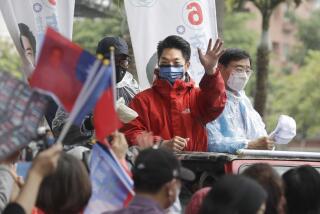Hong Kong’s Tung, on a Tightrope
- Share via
HONG KONG — When Tung Chee-hwa, the new boss of Hong Kong, settled his bearish body into his office sofa Friday night for a long chat, he hadn’t met with many Western journalists. But with apprehension about his true intentions growing both inside and outside Hong Kong, that reclusiveness looks finally to be ending. His handlers seem now to accept that this 60-year-old shipping tycoon cannot, no matter how much Beijing might wish it, play peek-a-boo with the public and the press forever. So finally this jowly, animated, successful businessman whose job is to bring the world’s feistiest and most entrepreneurial circus under the dour “special administrative” tent of the People’s Republic of China, is starting to step out.
Tung needs the world’s understanding; he clearly is on a tightrope, with the 6.3 million people here praying he doesn’t lose his balance. His recent proposals to modify statutory political rights, presumably put forth at China’s behest, have put the news media, if not the average Hong Konger-on-the street, on red alert--and put the rest of the world watching this amazing saga on the edge of its seat.
Tung emphatically insists that there is less to the new proposals than meets the eye and that their restrictions on political parties and street demonstrations may not even go into effect as currently written. Maybe, but despite Tung’s warm style and unquestioned affection for Hong Kong, the truth is that the gap on human rights and press-freedom issues between East and West is vast. “I am not saying freedom is not important,” he told me. “It is. But the West just doesn’t understand Chinese culture. It’s time to reaffirm who we are. Individual rights are not as important as order in a society. That is what we are, and we will be what we are. We will be Hong Kong, and we must find our own way.”
Tung clearly wanted to leave the impression that we in the West have got to stop staring at this place like it’s some Tiananmen Square disaster in the making. We’re rubber-necking on the freeway of international relations, he suggests, trying to catch a glimpse of some blood-and-gore collision at the Hong Kong interchange. He has a point, but what’s certain is that we do have to stop expecting Tung to act and sound like Thomas Jefferson (which he sure as heck isn’t). Face the reality, folks: Hong Kong is soon to be China’s. And if the West wishes to work with Tung, it must understand that on many issues, he will not just agree with Beijing because he has to but because in his heart, he sees things that way.
To what extent, then, will he tolerate political street demonstrations, much less the pesky press? The question gets under his skin. Raising his voice, he dismisses the British, who, he charges, only got religion about individual rights recently, when the world spotlight began to focus on their long colonial stewardship over Hong Kong. “And for all these 155 years [of colonial rule],” he said with passion, “no one [in the West] criticized British policies. .J.J. The British? They’re anti-Chinese and they have a total mistrust of China. So now I have to work very hard and prove to the world that we are going to be fine.” But if Hong Kongers aren’t to have all the freedoms of Americans, will they at least have more than the Chinese? He thought hard, then answered: “In Hong Kong, we have a culture. To demonstrate is part of our culture, and so people demonstrate. We are Hong Kong, we are not Beijing. Of course there will be freedom.”
Tung implies that his job as chief executive could become impossible if America and China constantly are at each other’s throats. Arguing passionately that there are no truly major strategic fault lines between America and China, he deplores the commonplace Western view that all you need to know about the Chinese political system is what you saw on CNN broadcasts from Tiananmen Square June 4, 1989. “Americans need to realize that it’s really quite unbelievable what is happening in China. The changes are just astounding. It [the Tiananmen massacre] is not going to happen again.”
That surely would be a blessing for all concerned, especially for those taking orders from Beijing. I’m told that when Tung telephones China, either the president or the foreign minister picks up. Interesting, but when the bosses of Beijing answer, do they listen as well as give orders? For in order for this historic give-back to actually work out well for everyone involved, at least two things must happen. Yes, the West must give Tung a chance to breathe; but, of equal importance, Beijing must give Tung a chance to be a Hong Konger and chart a path separate from the mainland’s.
Obliquely referring to that other “special administrative district” (Taiwan) that China would wish to gather under its untested “one country, two systems” formula, Tung noted sagely: “A successful Hong Kong is very important to China. It will make further unifications an easier job. It is in China’s national interest to make Hong Kong work.” No one could have put it any better.
More to Read
Sign up for Essential California
The most important California stories and recommendations in your inbox every morning.
You may occasionally receive promotional content from the Los Angeles Times.













